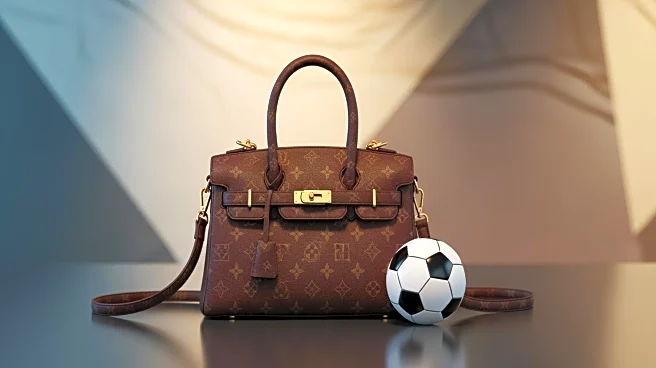What's Happening?
PwC's recent survey reveals a significant shift in luxury purchasing habits, particularly among younger generations. The 'Trends in luxury fashion: Consumer survey 2025' conducted across Italy, Germany,
the UK, France, and Spain, highlights that 40% of Gen Z and 28% of Millennials have engaged in buying secondhand products, indicating a growing preference for sustainable and affordable luxury options. The survey also notes that Gen Z and Millennials are driving the demand for more sustainable, inclusive, and digital models in luxury fashion. Clothing remains the most popular luxury category, with 69% of consumers purchasing at least one item in the past year. The findings suggest a transformation in luxury fashion, with younger consumers prioritizing sustainability, personalization, and accessibility.
Why It's Important?
The shift towards secondhand luxury purchases among younger generations signifies a broader change in consumer values and priorities. As Gen Z and Millennials increasingly seek sustainable and affordable options, luxury brands are compelled to adapt their strategies to meet these demands. This trend could lead to significant changes in the luxury fashion industry, with brands focusing more on sustainability, digital engagement, and personalized experiences. The growing interest in secondhand and rental options also suggests a move towards circular fashion models, which could have long-term implications for environmental sustainability and economic accessibility in the luxury sector.
What's Next?
Luxury brands may need to reevaluate their business models to cater to the evolving preferences of younger consumers. This could involve increasing investment in sustainable practices, enhancing digital platforms for personalized shopping experiences, and exploring partnerships with secondhand and rental platforms. As the demand for sustainable and affordable luxury continues to rise, brands that successfully adapt to these changes could gain a competitive edge in the market. Additionally, the industry might see increased collaboration between traditional luxury brands and innovative startups focused on circular fashion solutions.
Beyond the Headlines
The shift towards secondhand luxury purchases reflects deeper cultural and ethical considerations among younger consumers. As awareness of environmental issues grows, Gen Z and Millennials are increasingly prioritizing sustainability in their purchasing decisions. This trend could lead to broader societal changes, encouraging more industries to adopt sustainable practices and fostering a culture of conscious consumption. The emphasis on personalization and digital engagement also highlights the importance of technology in shaping consumer experiences and expectations in the luxury sector.









